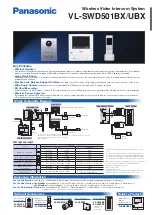
Page
2
of
6
WARNINGS:
Indicate potentially hazardous situations, which if not avoided, could result in death, serious injury, or
property damage.
Before use, all individuals who will be using the N
2
analyzer must become thoroughly familiar with
the information contained in this manual.
Strict adherence to the operating instructions is necessary for safe, effective product performance.
This product will perform only as designed if operated in accordance with this manual.
Repair or alteration of the analyzer beyond the scope of this manual, or by anyone other than
authorized service personnel, can cause the product to fail to perform as designed.
Never allow an excess length of tubing, or any accessory near a person
’s head or neck, which may
result in strangulation.
Always use protective eyewear and observe proper safety procedures when working with
pressurized gases.
The oxygen sensor is a sealed device containing a mild acid electrolyte, lead (Pb), and lead acetate.
Lead and lead acetate are hazardous waste constituents and should be disposed of properly, or
returned for proper disposal or recovery.
Do not expose the analyzer to high temperatures (>70°C).
CAUTIONS:
Indicate potentially damaging situations, which if not avoided, could result in minor injury, property
damage, or impaired analyzer performance.
Use only genuine accessories and replacement parts. Failure to do so may seriously impair the
analyzer’s performance.
Before use, ensure that the protective seal has been removed from the sensing port.
Before use, ensure that the analyzer has been properly calibrated. Calibrate the analyzer if
environmental conditions (such as temperature, humidity, pressure or elevation) have changed
significantly. Refer to “Factors Influencing Accurate Readings”.
Use of the analyzer near devices that generate electrical fields may cause erratic readings.
Dropping the analyzer can adversely affect its performance.
Do not immerse the analyzer in water or expose the analyzer to high humidity or moisture. The
analyzer is not watertight.
Do not immerse the analyzer in any cleaning solution or use an autoclave.
Do not over-pressurize the analyzer. Doing so may destroy the sensor. Allow no more than 3 PSI
(or 2 liters per minute of gas flow) to enter the analyzer.
If the LCD display goes blank immediately after operating the ON button, or the analyzer will not
properly calibrate, then the analyzer has expired. Do not use the device. Refer to Section 9
–
Disposal for proper disposal instructions.
1. INTRODUCTION
This manual describes the function; operation and maintenance of the N
2
analyzer. The N
2
analyzer is
engineered for long life, maximum reliability and stable performance.
NOTE
: In order to obtain optimum performance from your analyzer, all operation and maintenance
must be performed in accordance with this manual. Please read the manual thoroughly before using
the analyzer and do not attempt any repair or procedure that is not described herein. We cannot
warranty any damage resulting from misuse, unauthorized repair or improper maintenance of the
instrument.
Summary of Contents for Nitrogen Pac SC-W
Page 2: ... THIS SURFACE DELIBERATELY LEFT BLANK ...
Page 102: ...APPENDIX F SC W MANUAL ...
Page 103: ...APPENDIX F SC W MANUAL ...
Page 104: ...APPENDIX G SC W MANUAL ...
















































